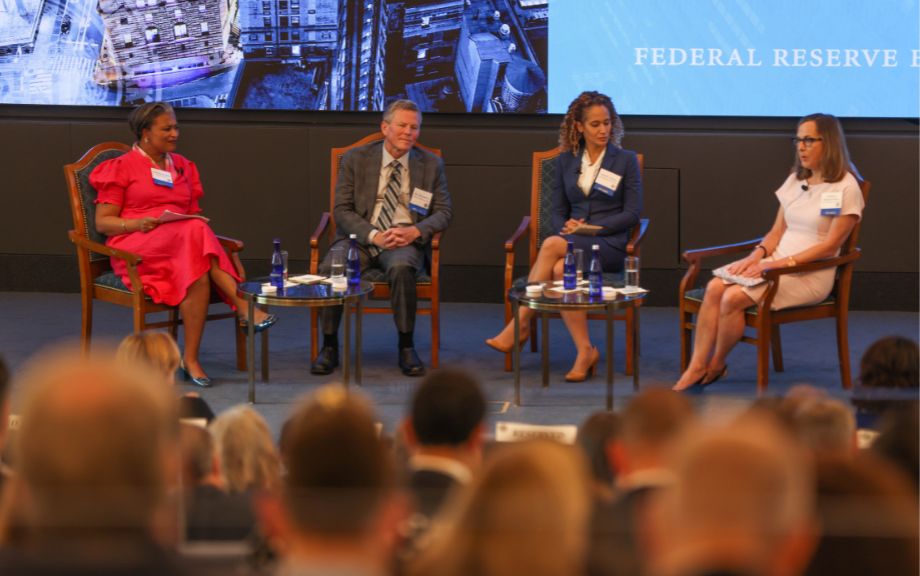
On June 20, the New York Fed hosted a half-day conference focused on culture in financial services. The event was part of the Governance and Culture Reform initiative’s ongoing efforts to understand and influence industry norms to help create a safer and more trustworthy banking sector. Here are the key themes that emerged during the day’s discussions:
1. The Power of Recognition
The most emphatic and deceptively simple takeaway that emerged was that to motivate desired behaviors, it is important to appreciate organizational staff and do so publicly. This often is easy to say and hard to do.
Behavioral economics scholar Dan Ariely opened the conference by sharing the research behind the “human capital” measurement approach taken at the investment research firm he co-founded. He noted that extrinsic motivations—such as compensation—appear to have little impact on profitability. Rather, it is intrinsic motivation, meaning how people feel about their jobs and the organization they work for, that increases profit. The single most potent driver of greater returns is a feeling of appreciation among employees, Ariely maintained.
In the panel that followed, speakers underscored the importance of appreciation, gratitude, and acknowledgment. Professor Mandy O’Neill, an expert in organizational behavior, emphasized that authentic, sincere expressions of gratitude are “the gold standard” for motivating positive employee behaviors. Beyond that, there was general agreement that even the simplest acknowledgement can make a difference. Neuroscientist Mauricio Delgado confirmed that even a thumbs-up emoji or a smiley face can be more motivating than some forms of monetary compensation.
At the same time, several speakers observed that failing to acknowledge staff efforts can breed toxicity and resentment, leading to suboptimal decision-making and ultimately creating the context for poor conduct. This concept also applies to acknowledging employees who speak up with constructive feedback. Recognition and acknowledgement go a very long way.
2. Use Positive Incentives for Long-Term Impact—And Use Them Often
Another key learning was that positive incentives tend to be longer-lasting than negative ones. Professor Delgado noted that the fear of loss or punishment can have short-term impacts on parts of the brain that drive immediate performance, but the neurological effect doesn’t last as long as it does with positive motivators. Moreover, over the long term, fear-based motivators can have the opposite effect in demotivating employee performance.
To emphasize the importance of frequent positive reinforcement, psychologist Kathleen Vohs discussed her paper “Bad Is Stronger than Good,” in which she and her co-authors found that the impact of negative financial incentives is twice that of positive ones. The effect is five times greater when it comes to interpersonal incentives, meaning five positive reinforcements are needed to offset just one perceived slight.
What does this mean for employers? Organizations that want to shape group norms and individual behaviors should favor positive reinforcement (recognition of contributions and accomplishments) far more than negative reinforcement (criticism, blame, etc.). Gratitude is free, and it pays.
3. Use Formal Processes to Normalize the Review of Systems, Not People
The second panel featured speakers from industries outside of financial services who discussed how mistakes can become opportunities for learning. Based on their experiences, panelists emphasized the importance of avoiding personal blame, and instead creating a regular team-based approach to analyze “how things went wrong,” learn as a group, and improve systems.
Mistakes are not opportunities to assign blame. Rather, they are useful sources of information about how to improve practices going forward. Some of the formal approaches across industries include:
- Professor Giselle Antoine described military “after action reviews,” which use collective deliberation to study and improve performance under intentionally stressful conditions.
- Kathleen Heppell-Masys, vice president for nuclear operations oversight at Atomic Energy of Canada, shared how her organization holds daily calls in which colleagues assess errors and assign corresponding actions—including in-depth, root-cause analyses and, in some cases, public disclosures.
- And Dr. Michael Ivy, deputy chief medical officer at Yale New Haven Health, described contemporary morbidity and mortality conferences as “unrecognizable” from those of previous eras. The conferences have evolved from “blaming and shaming” sessions to opportunities for groups to explore and resolve systemic or recurring problems from different perspectives, he noted.

4. Celebrate Curiosity and Integrity
Several panelists recommended promoting curiosity and a commitment to getting things right, even if that means admitting mistakes. This will change expectations, create positive culture carriers, and promote a virtuous cycle of continuous improvement. Dr. Ivy described awards for “near misses” and “great catches,” which recognize and reinforce behaviors around speaking up and avoiding problems before they materialize or worsen. The public nature of such awards creates models for others to emulate. Similarly, Professor Antoine indicated that leaders who admit their mistakes and share learnings can further normalize these behaviors and help others adopt a learning mindset.
5. Human Expectations Are Not Always Reliable
Another important insight was that humans are not great predictors of our own behavior—or that of markets. Often, our expectations are grounded in past experiences that aren’t always a good indicator of what will come next. This applies as much to individual behavior as it does to the behavior of organizations or markets.
Damian Williams, the U.S. Attorney for the Southern District of New York, illustrated this lesson in the context of criminal justice. Few people, he noted, set out to commit crimes. Much of the misconduct he sees sneaks up on people. Under pressure to show positive quarterly results, for example, they might fudge one number or bend one small rule, thinking they’ll clean it up in the coming quarter. But then they find that perhaps they need to double down. Things get out of their control, and before long they’ve crossed multiple lines in a way that was previously unimaginable to them.
In the event’s closing session, Federal Reserve Vice Chair for Supervision Michael Barr and New York Fed President John Williams discussed this concept in the context of banking. Vice Chair Barr noted that bank leaders and regulators are good at recognizing patterns and anticipating where they will repeat themselves, but that collectively as humans, we’re less effective at imagining novel events and paradigms. President Williams concurred, highlighting the importance of psychological safety—or an environment in which people are free to express thoughts and concerns and admit mistakes—in encouraging employees and senior management alike to speak up and challenge risk-management strategies and assumptions.
Vice Chair Barr raised the possible utility of reverse stress tests—scenarios in which firms consider what it would take to “break” the organization—to help see around corners and think about potential stress triggers and consequences. He acknowledged how difficult it can be to get outside our own collective heads and suggested that an interdisciplinary approach could help financial services firms and regulators to imagine the unimaginable.
President Williams concluded that financial services is not unique in dealing with these dynamics, and that there is much to learn from other industries about how to grapple with certain issues. What’s important, he emphasized, is to engage in the conversation.
For a replay of the 2023 Governance and Culture Reform Conference, please see the event page.

Toni Dechario leads the Awareness & Dialogue channel of the Governance and Culture Reform initiative.
The views expressed in this article are those of the contributing authors and do not necessarily reflect the position of the New York Fed or the Federal Reserve System.










